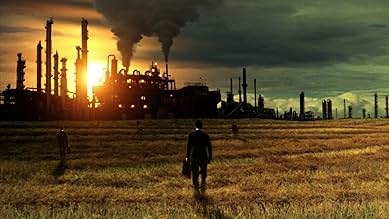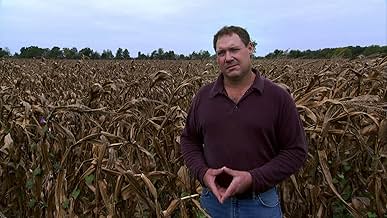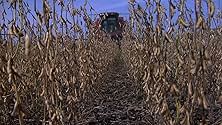AVALIAÇÃO DA IMDb
7,8/10
53 mil
SUA AVALIAÇÃO
Adicionar um enredo no seu idiomaAn unflattering look inside America's corporate controlled food industry.An unflattering look inside America's corporate controlled food industry.An unflattering look inside America's corporate controlled food industry.
- Indicado a 1 Oscar
- 7 vitórias e 20 indicações no total
- Direção
- Roteiristas
- Elenco e equipe completos
- Produção, bilheteria e muito mais no IMDbPro
Enredo
Você sabia?
- CuriosidadesOn the Region 1 DVD packaging, the UPC bar-code on the cow is different from the one shown on the theatrical poster. The bar-code on the poster is 4-73762-52481-6-(18). The bar-code on the Region 1 DVD packaging is 8-76964-00216-5 : the same bar-code that appears on the back cover of the DVD. As of 2022, the bar-code used on the poster is not an active code.
- Citações
Michael Pollan: There are no seasons in the American supermarket. Now there are tomatoes all year round, grown halfway around the world, picked when it was green, and ripened with ethylene gas. Although it looks like a tomato, it's kind of a notional tomato. I mean, it's the idea of a tomato.
- ConexõesFeatured in Durch die Nacht mit...: Tim Raue und Dave Arnold (2009)
- Trilhas sonorasSunny L.A.
Written by Nancy Peterson
Performed by Great American Swing Band
Avaliação em destaque
It is said that if you like eating sausage, you better not see how it is made. If you like eating meat, don't watch an animal being killed. If you have your fill of fruits and vegetables daily, don't think about the pesticides that coat them.
Our modern society has sanitized the presentation of food so that we can blissfully ignore what we should be concerned with: where food comes from, how it is raised, picked, handled, altered, transported and sold. Instead our attention is focused only on the awesome number of beautiful packages on market shelves, the unblemished fruits and vegetables available year round. In our increasingly artificial world appearance trumps taste, price trumps provenance, and industrialization gives us a false sense of safety.
It is therefore opportune to have the release of "Food, Inc". After you see it, you'll probably not shop for food in the same way. You may even change the kinds of food you eat. Not enough to convince me to become a vegetarian, but the ubiquitousness of corn and its derivatives, stated multiple times in the film, has made scouring of package labels a routine. The easy rule of not buying anything that contains more than five ingredients more frequently obeyed.
The film contains material that has already been brought out by others, for examples, (1) the problem of genetically modified seeds crossing into properties that do not want them and (2) the appalling conditions in which farm animals are kept. Some material is stressed too much, for example, the whole issue surrounding the tragic death of a kid from a very virulent form of E.coli and the attempts to establish regulations that might prevent such deaths. Individual cases are worth mentioning, but systemic and widespread issues are more compelling. The death of one is no doubt a tragedy but the impairment of thousands is of greater social consequence.
The issue of food regulation in general is a subject that I would have liked to see more of. The adverse effect of more regulation (as per the example above) can be too much regulation. The subject is briefly broached by the "good farmer" (Joel Salatin) who kills his chickens in the open. Ironically those chickens are likely to be more healthy and tasty. Regulation may eliminate this practice. Regulation can therefore have a negative impact on food culture. One of the best example of this is preventing the importation into the US of many delicious young unpasteurized cheese from Europe or even the marketing of such cheese by US producers. How many get sick from those cheese compared to the number of sick from peanut butter or spinach?
The film unwittingly projects a bit of naiveté in a couple of places. The segment about an individual being sued by a food conglomerate and essentially losing for lack of money is not news. This is a capitalist system: more money, better lawyers, almost certain victory. Yet the point is well taken that the food conglomerates are behaving in thuggish ways and acting with the protection of a complicit government (the best money can buy). But again, uncontrolled capitalism generates monopolies and they will fight tooth and nail to retain control and squash any semblance of competition. It's the logic of the beast. This not limited to food. Since voting habits have brought the US to this state of affairs, our only recourse as consumers is to eat bananas, and only bananas, for breakfast, lunch and dinner. It's called the Chiquita Diet.
In any case, this is a must-see documentary. The director is to be commended for having the courage of tackling this very important topic.
Don't forget to buy a five gallon basket of popcorn dripping with oleo and a big soda with plenty of high fructose corn syrup before going into the screening room. It may be the last time you do.
Our modern society has sanitized the presentation of food so that we can blissfully ignore what we should be concerned with: where food comes from, how it is raised, picked, handled, altered, transported and sold. Instead our attention is focused only on the awesome number of beautiful packages on market shelves, the unblemished fruits and vegetables available year round. In our increasingly artificial world appearance trumps taste, price trumps provenance, and industrialization gives us a false sense of safety.
It is therefore opportune to have the release of "Food, Inc". After you see it, you'll probably not shop for food in the same way. You may even change the kinds of food you eat. Not enough to convince me to become a vegetarian, but the ubiquitousness of corn and its derivatives, stated multiple times in the film, has made scouring of package labels a routine. The easy rule of not buying anything that contains more than five ingredients more frequently obeyed.
The film contains material that has already been brought out by others, for examples, (1) the problem of genetically modified seeds crossing into properties that do not want them and (2) the appalling conditions in which farm animals are kept. Some material is stressed too much, for example, the whole issue surrounding the tragic death of a kid from a very virulent form of E.coli and the attempts to establish regulations that might prevent such deaths. Individual cases are worth mentioning, but systemic and widespread issues are more compelling. The death of one is no doubt a tragedy but the impairment of thousands is of greater social consequence.
The issue of food regulation in general is a subject that I would have liked to see more of. The adverse effect of more regulation (as per the example above) can be too much regulation. The subject is briefly broached by the "good farmer" (Joel Salatin) who kills his chickens in the open. Ironically those chickens are likely to be more healthy and tasty. Regulation may eliminate this practice. Regulation can therefore have a negative impact on food culture. One of the best example of this is preventing the importation into the US of many delicious young unpasteurized cheese from Europe or even the marketing of such cheese by US producers. How many get sick from those cheese compared to the number of sick from peanut butter or spinach?
The film unwittingly projects a bit of naiveté in a couple of places. The segment about an individual being sued by a food conglomerate and essentially losing for lack of money is not news. This is a capitalist system: more money, better lawyers, almost certain victory. Yet the point is well taken that the food conglomerates are behaving in thuggish ways and acting with the protection of a complicit government (the best money can buy). But again, uncontrolled capitalism generates monopolies and they will fight tooth and nail to retain control and squash any semblance of competition. It's the logic of the beast. This not limited to food. Since voting habits have brought the US to this state of affairs, our only recourse as consumers is to eat bananas, and only bananas, for breakfast, lunch and dinner. It's called the Chiquita Diet.
In any case, this is a must-see documentary. The director is to be commended for having the courage of tackling this very important topic.
Don't forget to buy a five gallon basket of popcorn dripping with oleo and a big soda with plenty of high fructose corn syrup before going into the screening room. It may be the last time you do.
- rasecz
- 7 de jun. de 2009
- Link permanente
Principais escolhas
Faça login para avaliar e ver a lista de recomendações personalizadas
- How long is Food, Inc.?Fornecido pela Alexa
Detalhes
- Data de lançamento
- País de origem
- Central de atendimento oficial
- Idioma
- Também conhecido como
- Food, Inc.
- Locações de filme
- Empresas de produção
- Consulte mais créditos da empresa na IMDbPro
Bilheteria
- Faturamento bruto nos EUA e Canadá
- US$ 4.417.674
- Fim de semana de estreia nos EUA e Canadá
- US$ 60.513
- 14 de jun. de 2009
- Faturamento bruto mundial
- US$ 4.606.199
- Tempo de duração1 hora 34 minutos
- Cor
- Mixagem de som
- Proporção
- 1.78 : 1
Contribua para esta página
Sugerir uma alteração ou adicionar conteúdo ausente

Principal brecha
By what name was Alimentos S.A. (2008) officially released in India in English?
Responda























